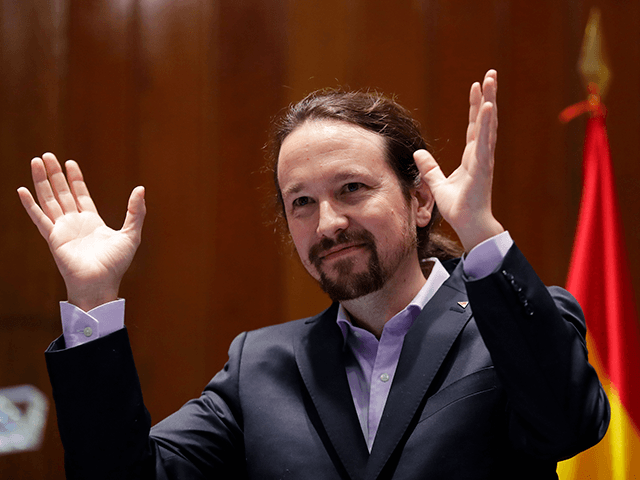Pablo Iglesias, a far-left former host on Iranian state television who served recently as Spain’s Second Deputy Prime Minister, often translated to English as “vice president,” announced his retirement from politics late Tuesday after a crushing defeat in Madrid’s regional elections.
Iglesias quit his post as the second most powerful person in Spain’s parliament, second to socialist President Pedro Sánchez, in March to announce that he would run as the leading candidate for his socialist party, Podemos (“We Can”), in Madrid’s regional legislative elections, challenging center-right Popular Party (PP) Madrid legislature president Isabel Díaz Ayuso for leadership of the body.
Iglesias, who has spoken favorably of mass murderer Mao Zedong and been accused of receiving funding from late Venezuelan dictator Hugo Chávez, came in last place in his personal election. Ayuso, running against him, received more votes than all leftist candidates combined. The PP won a resounding majority and the conservative party Vox, which will likely form a coalition with PP, made significant gains in the regional legislature. Ayuso ran a campaign on the unofficial slogan “communism or liberty” and has sternly criticized Sánchez’s government and local leftists on their handling of the Chinese coronavirus pandemic. Cementing Iglesias’ poor standing, the second most popular party was a leftist alternative to Podemos, Más Madrid, a local party. Podemos won fewer seats in the lawmaking body than all but one political party.
A shattered Iglesias declared, “we have failed” in a candid speech on Tuesday in which he said he had stopped “being useful” and would abandon politics entirely.
“Beyond the affection, it is evident that, today – and these results make this clear – I am not contributing to the sum of our parts,” Iglesias said. “I am not a figure that can contribute to winning over the Madrid Community [the lawmaking body] within two years.”
“When your role in an organization is limited and you mobilize the worst in those who hate democracy, you have to make decisions,” he said, announcing his retirement.
Iglesias did not fully take responsibility for his extremely low popularity in the country, describing himself as a “scapegoat,” who the right wing used to mobilize “the darkest elements, those most opposed to democracy and public services.”
In reality, Iglesias became a liability to the Spanish left through growing awareness of his public record praising violent communists like Mao Zedong, encouraging leftists to dismiss the violations of LGBT and women’s rights that define the behavior of the Iranian Islamic regime, and otherwise personifying violent Marxism. Iglesias was largely a marginal figure in Spanish politics before Podemos interrupted attempts by Sánchez’s Socialist Workers’ Party of Spain (PSOE) to defeat the PP in the 2015 parliamentary elections. Podemos became such a problem for the PSOE that Sánchez elevated Iglesias to lead a coalition government in 2020 in an attempt to avoid defeat.
Sánchez’s move made Iglesias one of the most powerful people in the country, second only to Sánchez outside of the royal family. Prior to entering politics through Podemos, Sánchez hosted a show on HispanTV, an Iranian government television network, known as Fort Apache. Fort Apache launched in 2012 and appears to have disappeared from HispanTV’s web presence following Iglesias’ co-leadership with Sánchez, though old articles about Iglesias on the network’s site still identify him as a television host there.
On Fort Apache, Iglesias defended Venezuela’s Chávez, the Revolutionary Armed Forces of Colombia (FARC) terrorist organization, and the “astute” Mao.
“I recall the words of the astute Mao Ze Dong, who said that power is born out of the barrel of a gun, and so it is. Unfortunately, politics is often built over corpses and the suffering of entire people. Today, we talk of peace, which as we all know, is built on the results of war,” Iglesias said in one FARC-themed episode.
Iglesias’ decision to receive a paycheck from Iran landed him in some hot water with fellow leftists, given Tehran’s brutal repression of its citizens. In a 2013 public panel discussion, he said of working with Iran, “It’s not that the left should, it’s that the left has no other choice.”
“We are not going to be the only imbeciles who don’t do politics when everyone does politics,” he asserted.
The Spanish legacy newspaper ABC reported Iglesias may soon return to television, this time remaining in Spain. A report in the newspaper prior to his resignation from politics alleged he had held conversations with television producer Jaume Roures to discuss a role on television conducting “critical journalism.” ABC initially described this as a “plan B,” but recalled the report on Tuesday as a new likely outlet for the politician.
ABC also noted Wednesday that Iglesias will continue to receive the $6,376.46 in monthly compensation, or 80 percent of his former salary, he has reportedly been receiving since resigning from the state since resigning from Sánchez’s government. Had he won his election, he would not be eligible for the compensation.

COMMENTS
Please let us know if you're having issues with commenting.